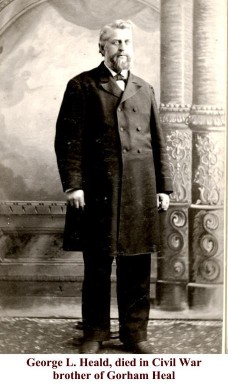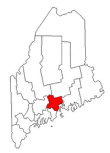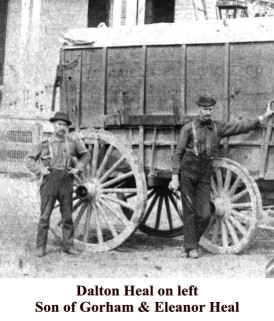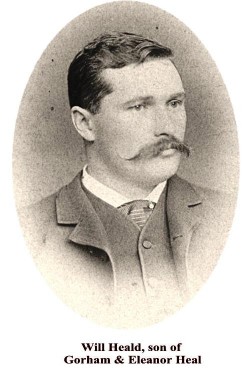Sometime
before 1993, my friend, Betsy, found a
divorce case in the Waldo County Court
records at the State Archives in
Augusta. At that time I had written
some of this story in the 'Out of The
Past' column in 'The Republican
Journal'. The story was
intriguing and haunting. The divorce
took place in May 1853, one hundred
fifty-seven years ago. The facts and
depositions about events that had
happened, sworn to by family, neighbors,
and friends, totaled more than fifty
pages.
The
divorce was being sought by forty-six
year-old Jane (Shepherd) Heal, who had
come from Jefferson, Me. where she had
married Gorham Heal of Lincolnville.
She has supposed that she would 'live
happily ever after', never once suspecting
what would lay ahead of her in life.
Gorham
and Jane had five children who lived to
adulthood, Augustus, Roxey Jane, Lucian,
Amanda and Roscoe. Jane stated in a
deposition that she "had always conducted
herself as a faithful, chaste, kind and
affectionate wife." But, she soon
found that her husband was very demanding
and abusive. He beat her so badly when
Augustus was but a few months old, that
she was bedridden for some time.
Gorham was claimed to be a powerful man.
Roxey made a deposition that she
remembered her father beating her mother
one time while she was in bed, pounding
her head upon the bedstead until she bled
from her nose and ears. He beat her
unmercifully, and at one time she
miscarried the child she was carrying
after a severe beating, which left her
unable to get out of bed for almost a
month. He grabbed her stomach in his
fist, twisted and threatened to "Send her
to hell". At this time, a doctor
came a couple of times to tend to Jane,
until Gorham told him not to come
again. Jane's mother and sisters
brought provisions and medicines for
her. Much of this time she was
confined to her bed, and could not even
get up. At those times he would
command her to get out of bed to
do this or that for him, and even dragged
her out of bed. Gorham had often
beat her with his fists in her side and
stomach, as well as kicking her.
Times like these, she and the children
feared even going to sleep in the house.
Gorham
kept the food and provisions, including
tea, coffee, candles and house staples
locked in a chest. This fact was
testified to by neighbors and
family. He kept a lock on the pork
barrel and the cellar door, as well as
nailing the flour barrel tight. He
kept the keys with him at all times. When
he was leaving for the day, he would
unlock the chest, taking out the vittles
that he wanted for a meal or for the day,
locking it up again when he left.
Neighbors testified at seeing him take out
his vittles for a meal, perhaps share a
little with the children, and refuse Jane
a mouthful.
Jane's
mother testified that her daughter had
written her after the birth of one of the
children, asking for help. Jane
wrote her mother that she and the children
were starving. The family
and neighbors would bring in food when
they knew that Gorham was not at home.
Jane's mother also testified that
Gorham had threatened Jane in her
presence, also threatened Jane's
sister, Rosalinda, with a horse
whip. Rosalinda stepped between him
and his wife, and he backed off,
threatening to punish her after they left.
He said that he did not fear God, man or
the devil.
When
Jane complained, asking for food for
herself and the children, summer or
winter, Gorham would have the boys bring
in buckets of cold water from the well,
which he would throw over her. Jane
testified that this had happened over
thirty times. Several local people
had seen this happen and testified to it.
At
one time Gorham's father, Peter Heal,
lived in part of the house.
When Gorham's brother,
George, married, Gorham unlocked the
chest, and prepared a feast for his guests
to be eaten in his father's room.
When young Augustus asked what he, and his
siblings would eat, Jane replied, "Indian
bread and tea." Gorham overheard the
remark, stepped to coals of the open fire
in the fireplace, grabbed the teapot, and
threw the boiling tea on Jane, scalding
her head. Both Roxey and Amanda
testified that she was blistered, and lost
most of her hair. While she was
still bedridden from this incident, Gorham
beat her badly one night as she was in
bed, then he stood outside of the bedroom
window all night, threatening Roxey and
Amanda that he would tie them to a post in
the kitchen and beat them to death, if
they helped her, even though they could
hear their mother begging them for
help. They never once doubted that
he would beat them. There were
testimonies of other atrocities and
depravations that he had committed against
Jane and the children.
| George would
have been Roscoe's, see below,
uncle, and they both died in the
Civil War. Roscoe was only
sixteen years old when he entered
the Service, and died two or three
months later. George Heald was
a brother to Gorham Heal. I do
not have pictures of Gorham nor of
Jane. She undoubtedly died
before photography was so popular,
which came into popularity during
the Civil War and after. There
is confusion in the spelling of the
name. The descendants of
Gorham Heal spelled their names
Heald, but the divorce records were
Heal. |

|
Moses
Young, overseer of the Poor, and Selectman
of Lincolnville testified that Gorham had
a well-stocked farm of seventy-five to a
hundred acres, always taxed to him, had a
good pair of oxen, a fine mare and a
two-year old colt, a few cows, and a
number of pairs of steers, a decent flock
of sheep, at that time all valued about
$1500, a fine sum and farm for that time.
In
May of 1853, Jane's brother, Lorenzo H. D.
Shepherd, brought suit against Gorham for
the following goods: Nov. 1850, one black
Alpaca dress for Gorham's wife,
provisions, boarding, flannel under
shirts, three pairs stockings, for money
lent to Jane in 1849, 1850, 1851 and 1852,
for boarding Jane, and to obtain
necessities for herself and Gorham and
Jane's family of minor children.
This was posted in 'The Republican
Journal' of 5 May 1853.
Jane had testified to the court that
she had fled to the neighbors on several
occasions in fear for her life, and Gorham
had threatened 'to drop her dead with the
first blow', at which time she told the
children that if she was found dead, to
tell what had happened to her.
After
the testimonies of her children, mother,
friends and neighbors, in May 1853, Jane
was granted a divorce from Gorham Heal, at
which time she was awarded $300 a month,
as part of her dowry. It is doubtful
that she ever received a cent. About
that time, Gorham and son Augustus left
for the 'Gold Rush' in California.
Gorham returned to marry a much younger
woman, Eleanor Wadsworth, by whom he had
eight more children. He reported
that Augustus had died in California in
1853. There is much in this story
that has to be imagined or to read between
the lines. What happened to
Augustus?
After
the divorce, Jane was forced to live off
relatives, friends and neighbors.
She died in Camden, Me., aged fifty-three
years, having been bedridden and feeble
most of her life, probably from the severe
beatings, abuse and malnutrition.
Roxey
Jane married and lived in Camden.
Augustus was aged about eighteen
years when he had died in California.
Lucian went to sea.
Roscoe
joined the Army during the Civil War, on
Sept. 20, 1862. He died of fever
aboard ship, aged sixteen years. His
Pension files give some interesting
information. Capt. Ansel Wadsworth
[who later became Sheriff of Waldo County]
made a sworn statement that Roscoe had
"taken a severe cold which prostrated him
so that he was treated in the regimental
hospital, but appeared sufficiently well
enough to embark on the Steamer, Matazas.
He was very anxious to go with the
company. The first day at sea,
Roscoe was sick with typhoid fever and
grew worse until the seventh of December
1862, just three months from enlistment,
at which time he died, and was buried at
sea."
Now
the story gets interesting. Gorham
Heal swore to the following on July 18,
1883, "I have lived on the farm I do now
twenty-seven years. In 1862, my
family consisted of my wife, named Jane
Shepard Heal who died in June 1862,
Augustus Heal, Roxie Jane, Lucian, Amanda,
who is a widow in Boston, Mass., and
Roscoe. An infant died in 1862."
Gorham had remarried in 1857.
Gorham
stated that he never had owned any real
estate and never disposed of any before or
since his son's death. His
neighbors, the same neighbors who made
sworn statements thirty years earlier in
Jane's defense, swore that Gorham Heal was
old and feeble, walking with a cane.
What Gorham did not report in his first
applications for a pension from Roscoe's
death, was that he was married in 1857 to
Eleanor, a woman thirty years younger than
he, and that he fathered eight children by
Eleanor, in addition to the six by his
former wife, Jane.
In
the several statements that he gave proof
of his marriage to Jane, he neglected to
state that he and Jane divorced in 1853,
and that she had died in Camden, not in
his home, and they were not man and
wife. Nor did he make a statement
that when he and Augustus went to
California, that he had given his
household and farm goods to a neighbor,
while he was physically and mentally
abusing his first wife.
Eventually Gorham did mention that he had
remarried in his affidavits.
The
Pension Records at the National Archives
in Washington, D. C. contain a wealth of
information. Roscoe's pension file
did reveal that Gorham Heal received a
pension of $8 a month, commencing when he
first filed in
1882. If Roscoe's mother
has lived, this pension should have gone
to her. In 1882, the date that he
applied to the War Department for a
pension, the ages of his children by his
second wife ranged from six years to
twenty-four years.
My
father once told a tale that his father
had told him. I do not know how old my
grandfather was when this event happened,
or whether he was alone or with his
father. He told of passing the Heal
home in the morning with a horse and wagon
on the way to Camden or Rockland. A
large tree stood just beside the house
near the road. As my grandfather
came along, a woman was
hanging from the tree. She
apparently had tied bed sheets together,
and tied them to a limb outside the
bedroom window. Who was this woman?
What
happened to Gorham Heal? Neither a
death date nor a grave site has not been
found for him. If a man is to be
remembered for the good he has done in the
world, then if he has done no good, then
he should be remembered as evil, or
perhaps not remembered at all.
Author's
note: I noticed that I have
Heal and Heald spelled both ways. In
the divorce, the name was spelled
Heal. The sons of Gorham Heald
spelled their name Heald, and that is what
I had put on the pictures. It is
confusing, but it happened in those days.
|




.jpg)

